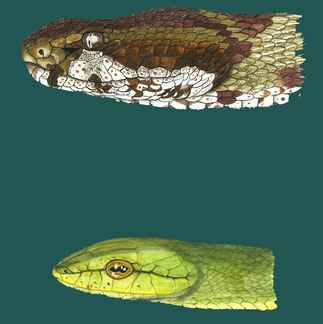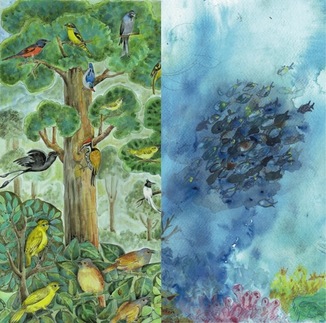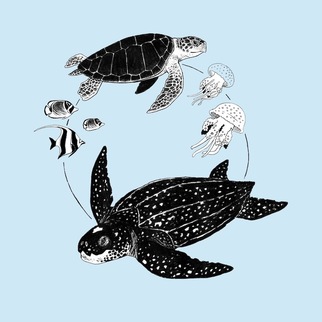Kartik Shanker
|
As faculty at the Centre for Ecological Sciences, Indian Institute of Science, I work on diversity at various levels of organisation, from genes to ecosystems, and at various scales from local communities to macro-ecological scales. We combine field ecology, phylogenetics and ecological modelling to understand evolutionary and biogeographic patterns in various marine and terrestrial taxa. We also work on the ecology and evolution of communities, particularly on mixed species foraging groups. We conduct research on the ecology and evolutionary biology of marine turtles and maintain long term monitoring programmes for species found in Indian waters.
I am working with my colleagues at Dakshin Foundation to develop and implement community based resource monitoring programmes towards more participatory governance of these resources, mainly in coastal and marine ecosystems. What else do I do ? Check out kartikshanker.in |
Research news
See our new papers on taxonomy and systematics:
New marine research projects:
- Pyron, R.A., V.P. Cyriac, S.R. Ganesh, A.K. Mallik, A. de Silva, A.N. Srikanthan and K. Shanker (2022) First report of hemipenial variation among some genera and species of shieldtail snakes (Serpentes: Uropeltidae). Icthyology and Herpetology.
- Gowande, G.G., S. Pal, D. Jablonski, R. Masroor, P.U. Phansalkar, P.M D’Souza, A. Jayarajan and K. Shanker (in press) Molecular phylogenetics and morphology of the “widespread” agamid species Calotes versicolor (Daudin, 1802) (Squamata, Agamidae) support taxonomic reassessment across South Asia. Vertebrate Zoology.
- Mallik, A.K., A.N. Srikanthan, S.R. Ganesh, P.D. Campbell, A. Malhotra and K. Shanker (2021) Resolving pitfalls in pit viper systematics – a multi-criterion approach to species delimitation in pit vipers (Reptilia, Viperidae, Craspedocephalus) of Peninsular India reveals cryptic diversity. Vertebrate Zoology 71: 577-619.
- Pal, S., Z. Mirza, P. Dsouza and K. Shanker (2021) Diversifying on the Ark: multiple new endemic lineages of dwarf geckos from the Southern Western Ghats provide new insights into the systematics and biogeography of South Asian Cnemaspis. Zoological Research 42: 675−691.
- Gowri Shankar, P., P. Swamy, R. Williams, S.R. Ganesh, M. Moss, J. Hoglund, I. Das, G. Sahoo, S.P. Vijayakumar, K. Shanker, W. Wuster and S.K. Dutta (2021) King or royal family? Testing for species boundaries in the king cobra, Ophiophagus (Cantor, 1836), using morphology and multilocus DNA analysis. Molecular Phylogenetics and Evolution 165: 107300.
- Srikanthan, A.N., O.D. Adhikari, S.R. Ganesh, K. Deuti, K. Das, V.M. Kulkarni, G.G. Gowande and K. Shanker (2021) A molecular and morphological study of Otocryptis Wagler, 1830 (Squamata: Agamidae) reveals a new genus from the far south of the Western Ghats, Peninsular India. Zootaxa 5016: 205-228.
- Mallik, A.K., A.N. Srikanthan, S.P. Pal, P.M. D’Souza, K. Shanker and S.R. Ganesh (2020) Disentangling vines: a study of morphological crypsis and genetic divergence in vine snakes (Squamata: Colubridae: Ahaetulla) with description of four new species from Peninsular India. Zootaxa 4784: 1-62.
New marine research projects:
- 'Marine Integrated Science for the Tropics (MIST)' funded by IISc, takes an inter-disciplinary approach that will engage experts from the disciplines of ecology, oceanography, climate sciences, computational sciences and conservation biology, in order to develop a broad understanding of marine ecosystems in the islands.
- We have also deployed and retrieved 10 Autonomous Reef Monitoring Structures (ARMS) in the Andaman Islands. Molecular analysis is underway to identify the faunal diversity of these reefs.
- We are initiating an Indo-French (CEFIPRA) project in collaboration with Dr. Katell Guizien and colleagues at CNRS, France. The project aims to monitor reefs and reef fish using ARMS and Baited Remote Underwater Video Surveys (BRUVS), and use oceanographic modelling to understand reef system dynamics towards better conservation and management.
Research themes
Diversity and distributionWe work on the diversity and distribution of a range of taxa at multiple spatial and temporal scales. We are also interested in large scale altitudinal and latitudinal patterns using integrated models which incorporate neutral theory, ecology and evolution. Our current research includes studies of distribution patterns of birds and plants, and phylogeny and biogeography of snails, frogs, lizards and snakes.
|
Mixed species foragingWe are examining the role of positive interspecific interactions in structuring biological communities. Research in our lab focuses on different kinds of interactions including mixed-species foraging groups. We examine the costs and benefits of hetero-specific grouping in diverse systems from bird flocks in tropical forests to schools of marine reef fish.
|
Marine turtle biologyI started conducting research on sea turtles in 1999 with a project on the molecular ecology of olive ridleys in Odisha. Since then, my team has established long-term monitoring programmes for olive ridleys in Rushikulya (Odisha) and leatherback turtles in the Andaman and Nicobar Islands. More recently, we have started work on green turtles in the Lakshadweep Islands.
|
Select recent papers
- Bharti, D.K., K. Guizen, A. Das, P.N. Vinayachandran and K. Shanker (2022) Connectivity networks and delineation of distinct coastal provinces along the Indian coastline using large-scale Lagrangian transport simulations. Limnology and Oceanography.
- Kale, N., M. Muralidharan, D.K. Bharti, M. Poti and K. Shanker (2022) The island hoppers: how foraging influences turtle numbers over time and its implications within the Lakshadweep archipelago, India. Endangered Species Research.
- Theo, A. and K. Shanker (2022) Composition and behaviour of mixed-species foraging groups of reef fish in the Lakshadweep Islands, India. Bulletin of Marine Science.
- Bangal, P., H. Sridhar, D. Shizuka, L.N. Vander Meiden and K. Shanker (2022) Influence of flock size on node importance and sub-structures in mixed-species flock networks. Oecologia.
- Oommen, M.A. and K. Shanker (2021) Skin in the game: widening the spectrum on male pursuits of dangerous animals. Journal of Anthropological Research 77: 362-396.
- Pusapati, C., M. Manoharakrishnan, A.D. Phillott and K. Shanker (2021) Effect of hatchery nest environment on olive ridley (Lepidochelys olivacea) hatchling performance. Chelonian Conservation and Biology.
- Bangal, P., H. Sridhar and K. Shanker (2021) Phenotypic clumping varies with trait and flock size in the assembly of mixed-species bird flocks. Frontiers in Ecology and Evolution 8:537816.
- Bharti, D.K. and K. Shanker (2020) Environmental correlates of distribution in the intertidal gastropods Littoraria and Echinolittorina spp. across spatial scales in the Indian Ocean. Journal of Molluscan Studies.
- Page, N. and K. Shanker (2020) Climatic stability begets diversity: Latitudinal trends in ranges, richness and replacement of woody plants in the Western Ghats. PLoS ONE 15(7): e0235733.
- Gupta, T., H. Booth, W. Arlidge, C. Rao, M. Manoharakrishnan, N. Namboothri, K. Shanker and E.J. Milner-Gulland (2020) Mitigation of elasmobranch bycatch in trawlers: A case study in Indian fisheries. Frontiers in Marine Science 7: 571. [PDF]
- Mohan, A.V., P.O. Ter Wengel, K. Shanker and M. Vences (2020) The Andaman day gecko paradox: an ancient endemic without pronounced phylogeographic structure. Scientific Reports 10: 11745. [PDF]




